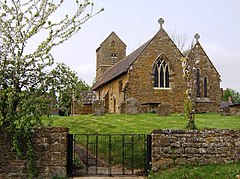Claydon, Oxfordshire
| Claydon | |
|---|---|
 St. James the Great parish church |
|
| Claydon shown within Oxfordshire | |
| Population | 306 (parish) (2011 Census) |
| OS grid reference | SP4550 |
| Civil parish | |
| District | |
| Shire county | |
| Region | |
| Country | England |
| Sovereign state | United Kingdom |
| Post town | Banbury |
| Postcode district | OX17 |
| Dialling code | 01295 |
| Police | Thames Valley |
| Fire | Oxfordshire |
| Ambulance | South Central |
| EU Parliament | South East England |
| UK Parliament | |
| Website | Claydon Village |
Claydon is a village in Claydon with Clattercot civil parish, about 6 miles (10 km) north of Banbury in Oxfordshire. The village is about 417 feet (127 m) above sea level on a hill of Early Jurassic Middle Lias clay.
The village is the northernmost settlement in Oxfordshire. The parish is bounded by Warwickshire to the west and Northamptonshire to the east. The 2011 Census recorded the parish's population as 306.
The Church of England parish church of Saint James the Great was a dependent chapelry of the parish of Cropredy until 1851. St. James' was originally Norman, built in about AD 1100. The arcade between the nave and north aisle survives from this date, as does the south doorway. Slightly later a chapel was added at the east end of the north aisle, linked by Early English Gothic arches to both the aisle and the chancel. There is also a squint from the chapel to the chancel. The bell tower was added in the 14th century, and the chancel was extended eastwards in either the 14th or the 15th century. The south porch is a late Mediaeval Perpendicular Gothic addition, and the ironwork on the south door was added in 1640.
In 1856 the Bishop of Oxford, Samuel Wilberforce, expressed dissatisfaction with the condition of the church building. In 1860 the Gothic Revival architect William White heavily restored the building, including renewal of the foundations. White almost completely rebuilt the north aisle, and so altered the chancel that its original date may not be determined with certainty.
...
Wikipedia

